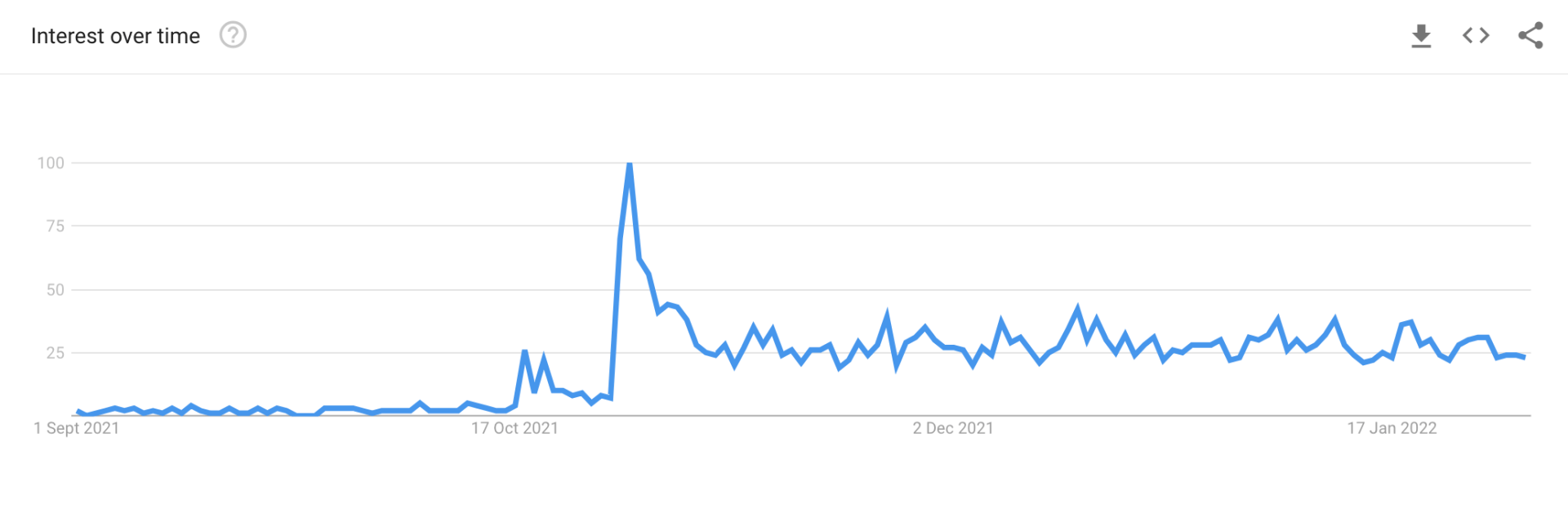hello@simplyvideo.io
What is the metaverse? (And will it succeed?)
Everyone's talking about the metaverse, but few can say exactly what it is. Read on to learn the facts, the history, and our best guess at its future.

What does "metaverse" mean?
Unless you've been living under a particularly comfortable rock, you'll have heard the term "metaverse" by now. It's everywhere.
But the metaverse isn't like most tech movements. Because although the metaverse might be on everyone's lips, few can define what it actually means.
Futurists and tech philosophers like to think big. They describe it as a whole new form of internet – a monolithic, immersive world. Under this definition, users won't just interact with the internet, they'll inhabit it – perhaps as realistic avatars, fantastic creatures, or something altogether more abstract.
Pragmatists, meanwhile, focus on what's possible today. They think of the metaverse as a series of immersive virtual spaces, where users can chat, play games and collaborate – again, as 3D avatars. To them, the metaverse isn't a replacement for the internet, but simply another way of interacting in cyberspace.
Why all the ambiguity? Well, it might be because nobody is quite sure how the technology will work… yet.
Think back to the early days of the internet. In the 1990s, the web had matured to the point where mass adoption was possible. And in the ensuing buzz, the media tied itself in knots attempting to explain the technology, its impact, and our interactions with it.
That's why we used to hear lingo like "surfing the net" and "the information superhighway". Nowadays, these terms sound clumsy – even cringe-inducing. But they were the natural result of a world trying to make sense of an emerging technology.
Perhaps the metaverse is going through its own teething years. Maybe in a decade, we'll look back at our confused attempts to explain it and giggle to ourselves. But that's only because we'll know it like the backs of our hands.
Who coined "metaverse", as a term?
It wasn't Mark Zuckerberg.
The CEO of Meta (née Facebook) certainly popularised the concept. In October 2021, he delivered a now-famous video presentation in which he outlined his vision for the metaverse. And just like that, Google went wild:
However, the word "metaverse" predates Zuckerberg's video by nearly three decades. According to The Oxford Handbook of Virtuality, the word was coined by writer Neal Stephenson in his 1992 novel Snow Crash.
There's a big difference between Stephenson's metaverse and Zuckerberg's vision, though. Stephenson is a science fiction writer, and his conception of the metaverse fell squarely in the realm of the fantastical. Thanks to advances in technology, Zuckerberg's modern metaverse is entirely feasible as a technical reality.
In fact, it's already here.
When will the metaverse be launched?
Meta has already dipped its toes into the metaverse with the launch of Horizon Worlds in December 2021. Described as a "social experience where you can create in extraordinary ways", Horizon Worlds lets users collaborate in group activities ranging from games to meditation sessions.
However, it's clear that Meta sees this as the first step on a long journey. On its website, it exclusively talks about the metaverse in the future tense, promising that it "will let you socialise, learn, collaborate and play in ways that go beyond what we can imagine".
So the modern metaverse is a long way off, then? Well, it's certainly a developing idea, but that doesn't mean it's anything new.
Users have been immersing themselves in virtual worlds for decades. One of the most popular platforms is Second Life, a 3D "life sim" that debuted in 2003. Before that, there were 2D MMOs (massively multiplayer online games), such as 1997's Ultima Online and 1987's Habitat.
Yes… 1987. If you ever need confirmation of the metaverse's appeal, just consider that we've been trying to create it – or something like it – for almost as long as interactive media has existed.
But despite several aborted attempts, the world is once again excited about the possibilities of the metaverse.
Why? Well, to quote The Six Million Dollar Man… "we have the technology".
How will users interact with the metaverse?
Early visions of the metaverse were limited by a seemingly insurmountable obstacle: two-dimensionality.
While virtual worlds provided some level of immersion, the fact remained that you were interacting with these worlds on a flat, two-dimensional computer screen. They just weren't the same as, well… real life.
Here's where things get really exciting. Because extended reality technologies have now matured to the point where total immersion is possible.
Virtual reality headsets, for instance, have already enjoyed widespread adoption among gamers. Equipped with powerful CPUs and graphics processors, they deliver lifelike worlds that respond to user input with astonishing accuracy.
If you haven't tried VR, take our word for it – the effect is mesmerising. As you move your head, the world moves with you. As you reach out your hand, you see a virtual hand respond in kind.
Very impressive. But we can already take things one step further, using some incredible technology called augmented reality (AR).
AR devices – such as the Magic Leap and HoloLens – don't just craft virtual worlds. They allow virtual elements to co-exist with our lived reality.
We're no longer limited to socialising in game-like worlds. Instead, we could slip on our AR headsets and enjoy a natural-feeling metaverse experience, right there in our living rooms.
Right now, the architects of the metaverse have both AR and VR in their sights. We can't wait to see where they take them.
Will the metaverse succeed?
This is a common question. However, we don't think it's quite the right question to ask.
The metaverse isn't a new invention, despite what Meta might like you to believe. If we allow ourselves to ruminate on its eventual success, we have to treat it like a monolith – a singular idea that can live or die by the whims of the market.
But this isn't how the metaverse has come to be. As we've seen, it's far from monolithic – instead, it's a grouping of concepts, thought experiments and noble failures that have arisen over time.
Now, technology has caught up with our imaginations. And as we stand ready to deliver a new kind of online interactivity, we've grouped these disparate strands of thought under a single banner: the metaverse.
In our eyes, this is what the metaverse truly is – a label to help us organise ideas that have been developing for more than 30 years.
Those ideas would have come to fruition in any case. But now we've given them a label, the technology looks set to progress faster than ever.
Watch this space.
What do you think the metaverse will look like in 10 years? Let us know in the comments!

Contact Us
Connect global teams. Collaborate with remote experts. Streamline processes and unlock cost savings with industry-ready extended reality technology.
Contact Info
hello@expandreality.io
Gemini Business Park
Sheepscar Way
Leeds
LS7 3JB
All Rights Reserved | Expand Reality








